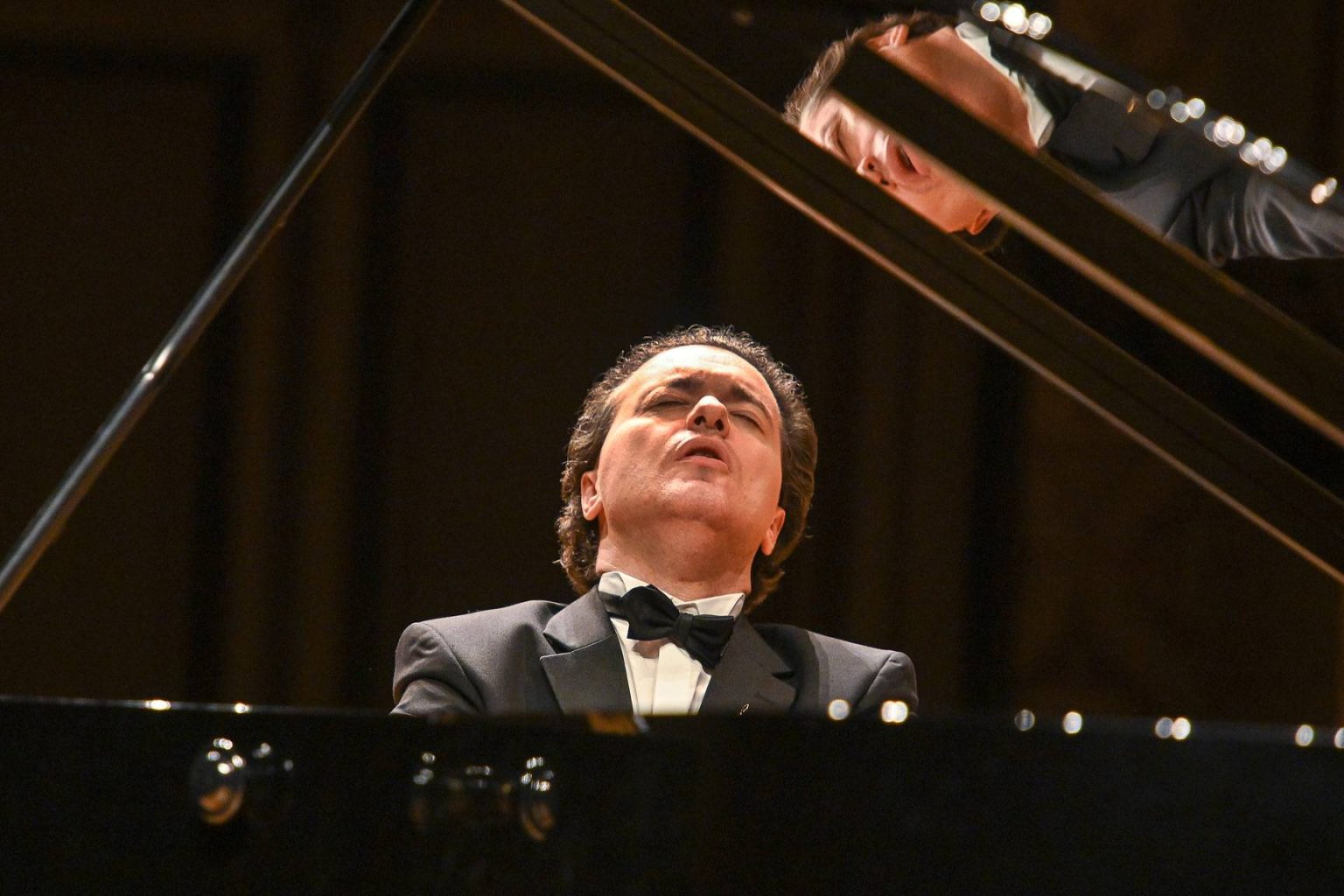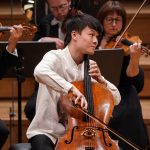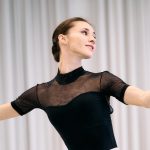by Michal Rezek
There is hardly a single music lover who wouldn’t know the place Evgeny Kissin occupies in the world of classical music—or what his presence means for the art of interpretation. Many are also likely aware that he has been living in Prague for quite some time now. Our interview took place in the serene setting of his beautiful apartment. It was completely quiet and peaceful—an environment in which he clearly feels at home. Before long, I found myself feeling much the same. On September 29, 2025, Kissin will open the concert season of the Czech Chamber Music Society at the Dvořák Hall. This year, he is also serving as the Artist-in-Residence of the Czech Philharmonic.
Evegny is a commanding and confident figure on stage—but in private, he is modest and even a little shy. From the very beginning, our conversation was entirely informal. His natural curiosity soon began to outweigh his initial reserve, and about ten minutes in, I asked if it would be alright to record our talk—in his mother tongue.
Evgeny, everyone is naturally curious about your early beginnings and the path that led you—at such a young age—into the very top tier of the international piano world. When did you first start playing the piano?
We had an upright piano at home. My mother taught piano, and my older sister also played. I was eleven months old when I began singing along to what my sister was playing. At the age of two years and two months, I started standing at the piano and playing by ear—what I had heard from her or from records. No one pushed me to do it; it came entirely naturally. Of course, I was very small, so I don’t remember any of it myself.
Was your mother your first teacher?
No, my mother never intervened in my playing. I did everything at the piano on my own. It wasn’t until I turned six that I began attending the Gnessin Music School in Moscow. My first and only teacher was Anna Pavlovna Kantor. She didn’t have a family of her own and became very close with ours. After a while, she moved in and lived with us as part of the family.
What kind of teacher was she?
Strict, but fair.
Did you practise a lot as a child?
Not really. Everything came quite easily to me, so there was no need to practise much. That changed when I began preparing for my international debut—performing both Chopin piano concertos in a single evening. I had already played a Mozart concerto with orchestra and given solo recitals, but this was something else entirely. In preparation, I practised five to six hours a day. The concert took place in March 1984, in the Great Hall of the Tchaikovsky Conservatory, accompanied by the Moscow State Philharmonic under Dmitri Kitayenko. It was recorded and later released.
How did you experience that concert?
I knew it was something very important, very serious—and that I had a responsibility.
Naturally, other concerts followed, and Anna Pavlovna often travelled with you. When did you realise that the Soviet system had begun to treat you as something of a showcase figure—someone to be displayed as proof of cultural excellence?
At the time, I wasn’t aware of that at all. I was entirely focused on music. I can’t recall when exactly it first occurred to me. But of course, when I started travelling abroad, I noticed very clearly that it was a different world. I still remember my first tours in Japan and America—those differences were impossible to miss.
Did you ever take part in any piano competitions?
No, never.
What about masterclasses?
Anna Pavlovna and I occasionally attended masterclasses to observe, but I never played in any of them. After a concert in St Petersburg, I met the distinguished pianist and teacher Vladimir Nielsen. Later, I would attend his masterclasses in Moscow as a listener.
Did you never feel the need to compare Anna Pavlovna’s approach with that of other teachers—to gain a broader perspective?
No. She was more than enough for me.
Anna Kantor not only taught you, but also trained other great pianists. I’m personally familiar with Nikolai Demidenko, whom I’ve heard perform live, and also with Ludmila Berlinskaia. Do you still keep in touch with any of your former classmates?
As a child, Anna Pavlovna often held up Nikolai as a model for me. I’m still in touch with a few of my classmates—in fact, I recently exchanged messages with one of them.
Your website lists an extensive discography. I happened to find a CD at home that isn’t included. Would you like to take a look?
It’s not listed? What do I play on it? Ah—the Third Sonata by Chopin. Yes, I remember now. I was very young. It was a lovely concert in Yokohama. They even recorded it on video.
Your performance was full of massive dynamic contrasts—thunderous sound at times, then moments of near silence. The tempos ranged from the fastest imaginable to the slowest. It felt almost symphonic, as though you were conducting with your own hands.
Oh? I never thought of it that way. I was mostly searching for polyphonic elements in Chopin’s writing—there are quite a few.
How did you perceive your own talent at the time?
I didn’t really think about it. I simply wanted to play. But of course, it was hard not to hear what people around me were saying. My mother and Anna Pavlovna spoke of it often. What affected me more, though, was when they criticised something in my playing. They would point out what they didn’t like, always finding something to correct. It was a constant push to work harder and improve.
What were your dreams as a teenager? What did you long for?
Let me try to remember—what age do you mean? Fifteen, sixteen? (pause) I think I wanted to have a clear plan of the composers and pieces I wanted to learn. That’s all I can recall.
Did you always choose your repertoire yourself?
Always in consultation with her [Anna Kantor]. But we never argued about it—it was always a mutual decision.
And later, when your career was in full swing—did agencies ever try to dictate what you should play?
No, I always chose my own programmes. No one interfered. Well—maybe once or twice. Herbert von Karajan asked me to play Tchaikovsky’s First Piano Concerto with him. Carlo Maria Giulini requested Schumann.
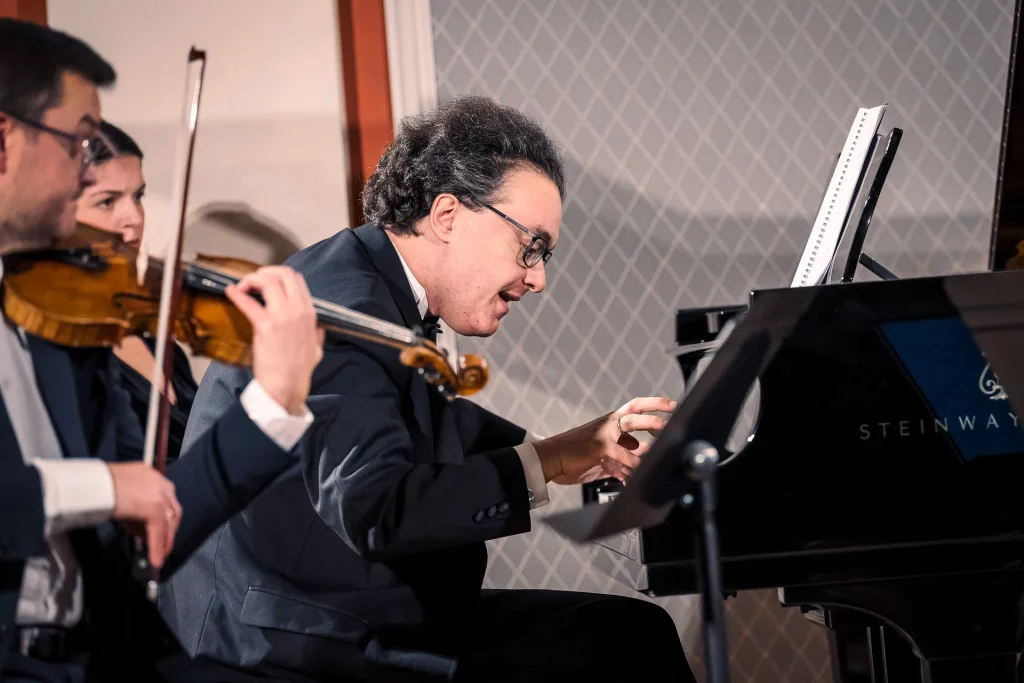
As a very young artist, you were already performing on some of the world’s most prestigious stages, constantly under observation. How did you cope with the psychological pressure?
I realised early on that the way to avoid stage fright was to practise—a lot. Around eight hours a day. When you repeat something many times, it no longer feels threatening once you’re on stage. I remember when I was twenty, I was invited to perform at the Grammy Awards ceremony. I didn’t win a prize that year, but they asked me to play part of Liszt’s Spanish Rhapsody.
When I arrived, they gave me a dressing room with a piano. Someone from the TV production team came in and told me that the broadcast—including my performance—would be watched by 1.6 billion people. That’s the kind of thing that makes you nervous. I still had a few hours before going on, so I just kept playing the same passage again and again, over and over.
When the time came, I walked on stage—and because I had played it so many times, I simply repeated it one more time. Just like I had done in the dressing room. Calmly. Without nerves. That’s when I truly understood that the only way to overcome stage fright is through intense preparation and practice.
How has your choice of repertoire evolved over time?
I’ve always loved Chopin. With other composers, my preferences have shifted throughout my life. But Chopin has remained constant—he’s always felt the closest to me. I used to be very fond of Brahms, but a few years ago I found myself gravitating more towards Schubert. I now prefer him.
Have you played Czech music as well?
Yes. I’ve performed Dvořák’s Piano Quintet in A major, Op. 81, several times. Once, I played Smetana’s Vltava in a four-hands version with András Schiff—I took the upper part. We also performed eight of Dvořák’s Slavonic Dances, and for those, we swapped: I played the lower part. We had planned to perform the programme more often, but I came down with Covid. When I recovered, Schiff caught it, so we never managed to repeat it. We’re now planning to perform that programme in the Rudolfinum next year, in a concert organised by the Czech Philharmonic.
Yes, you are the Czech Philharmonic’s artist-in-residence this season.
It’s a great honour for me. The Czech Philharmonic is a wonderful orchestra.
You’ll be appearing in several concerts this season. The first will be on 29 September 2025, when you’ll perform with Joshua Bell and Steven Isserlis in a piano trio at the opening concert of the Czech Chamber Music Society. Then, on 5, 6, and 7 November, we’ll hear you in Prokofiev’s Piano Concerto No. 3 in C major, with the Czech Philharmonic under Semyon Bychkov. And on 11 January 2026, you’ll give a solo recital. Our audience is eagerly awaiting all of these appearances—and I, for one, am thrilled that we’ll have the chance to hear you more often.
So am I. It makes me very happy.
Evgeny, you’ve been living in Prague for nine years. I once saw you on the street, but otherwise, you’ve kept a rather low profile. You’ve performed very little here—yet you’re only fifteen minutes’ walk from the Rudolfinum.
The Rudolfinum is one of the finest concert halls I know. I’d love to play there more often. Now that I have a steady relationship with the Czech Philharmonic, I’ll be giving them dates when I’m available for concerts.
I also came across several of your compositions—piano pieces, a cello sonata. Do you still compose regularly?
Only when I have the time. So far, I’ve published six opus numbers. I also wrote the music for a play by Marianna Arzumanova, Gramophone. It’s a piece with a Jewish theme, and it features my music. In addition, I’ve recorded three CDs on which I recite Hebrew poetry.
Your Hebrew is flawless, but your mother tongue is Russian.
Yes. But that’s the only connection I still have to Russia.
Do you still have friends there?
A few, yes.
When was the last time you were in Russia?
Before the pandemic. I gave a concert at the Pushkin Museum in Moscow.
Do you plan to go back?
Of course not.
Are you happy living in Prague?
Yes—very much so. My wife has lived here for twenty-three years.
And yet, do you ever fear for the future?
I do. I know your history well—1938, and then 1968. Your European politicians should remember that, and act accordingly. If the Russians take Ukraine, Slovakia will welcome them in—and then they’re here. And soon after, beyond.
You’ve been labelled a “Western agent” in Russian propaganda because of your views. Are you aware of that?
Yes.
Thank you for your openness. Of course, more detailed statements are available on your official website—and if you prefer, we can omit this part of the interview when it’s published.
I’m telling you this because it belongs in the interview.
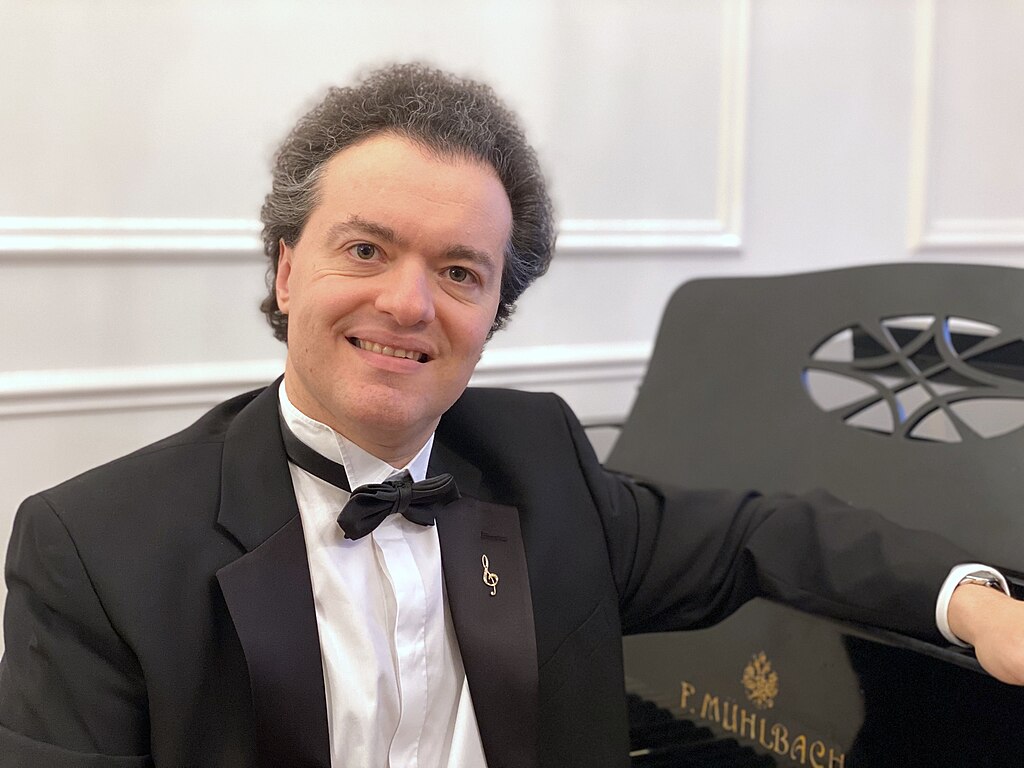
Thank you. Let’s return to music and your playing. At home you work, you create a concept for what you will perform, you search for tempo and dynamic plans, and you try to find the ideal character and moods of what you play. You think through every detail, and then you step onto the stage. Is it exactly as you rehearsed at home and brought to perfection?
It’s all different then—the atmosphere and the hall’s acoustics are there. And there is the audience, which gives you enormous inspiration. You don’t change the concept—it is set—but there are subtle nuances, and there are many of them. On stage, everything is simply different. You can add something, improve something—it’s no longer just home practice and rehearsal. I’m not talking about fundamental changes, but momentary ones. It’s a matter of mood and atmosphere.
When you return to certain pieces after some time, can you change the concept?
Fundamentally, no. But I always believe and feel that I can play it better than before.
Do you remember these pieces by heart even after many years?
Yes, but I always take the sheet music and review it again.
And what if you find a better fingering than the original?
I don’t understand.
When you study a new piece, do you at least write down some important fingerings?
No, I don’t.
Ah… Which piano concerto is your favourite?
Chopin’s First, in E minor. I am not very fond of the third movement, but the first two—especially the first—I love.
And does the imperfect orchestration, the simplicity of the orchestral part, bother you?
I don’t notice it.
What are your plans for the future?
Next year’s programme is set. As a soloist, I will play Beethoven, Chopin, Schumann, and Liszt. With orchestra, I will perform Prokofiev’s First Concerto and also a Scriabin concerto.
And beyond that?
In 2027, I will play a lot of Beethoven.
You have recorded all of Beethoven’s piano concertos. Do you plan to perform them for Beethoven’s anniversary in 2027?
No, I won’t play those. But I am preparing several piano trios and solo works. I also plan to perform Schubert’s Piano Quintet for his anniversary—I first played it at fourteen, and I look forward to returning to it.
Do you have any more distant plans?
(long pause) I have had a fixed plan since my youth, extending to 2050. I have a list of what I want to learn, though sometimes I must revise it. Now I know that certain pieces must be learned while I still have strength, because later it will no longer be possible. A few years ago, I unexpectedly learned both of Liszt’s piano concertos—later, it could have been a huge effort. Strength diminishes; we only have a limited amount. Now I choose only my most beloved pieces, and I hope to live long enough to learn them all.
My final question: In 2018 you wrote your autobiography. Now, several years later, would you write anything differently?
I wrote it in Russian, and it was translated into several other languages. Certainly I would write some things differently or add material. During the pandemic, I kept a diary where I wrote about my memories from the past, and it contains much that isn’t in the autobiography. I wrote it all in Hebrew. It was published in English in an American magazine, and a book edition is now planned.
Was it difficult for you during Covid to stay home, without an audience, without concerts?
Not at all. I rested and had plenty of time to practise.
Our conversation continued further, covering music, Prague, theatre, and politics. Even in this shortened form, the interview greatly exceeds the desired length. My translation is not literal; it is free. Where possible, I combined several thoughts together, and left some brief responses authentic. During the conversation, Jevgeny switched to informal speech, which I omitted for the sake of formal consistency.
Note: Marianna Arzumanova, theatre director, is founder of the Theatre MA. Her sister, Karina Arzumanova, is Jevgeny’s wife, and he is also a patron of this theatre.


